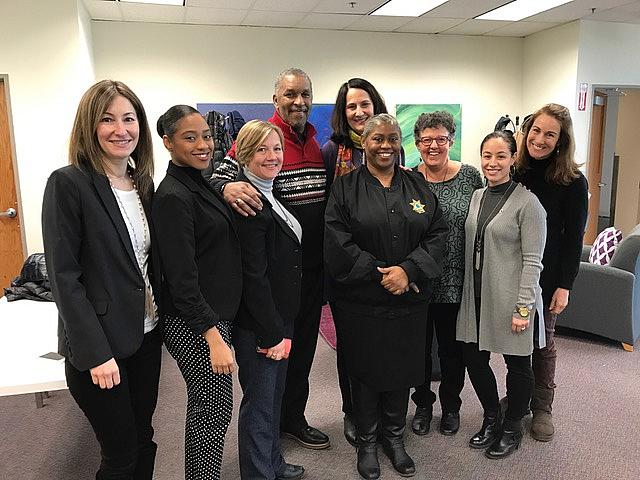
Members of the Louis D. Brown team and SIF Executive Coaches, including Lina Foster (second row, second person from the left)
Welcome Wyona Lynch-McWhite, SIF's New Executive Director!

Members of the Louis D. Brown team and SIF Executive Coaches, including Lina Foster (second row, second person from the left)
What’s it like to be an Executive Coach in the Social Innovation Forum’s (SIF) Social Innovator Accelerator? Every year, we match our Social Innovators with one or more coaches to help them set and achieve leadership goals. We recently sat down with Lina Foster, who has volunteered with SIF as an Executive Coach for over five years. We asked Lina about her experiences working with our Social Innovators.
In your own words, can you describe the Executive Coaching program?
Executive Coaching is a one-on-one relationship between a leader and a professionally trained coach to support the leader's professional development. The coach works with the Innovator to identify specific areas that they want to work on, then helps design a plan to address those goals. Known as 360-degree feedback, often the coach will interview people who work closely with the Innovator to provide guidance on their leadership. This feedback helps the Innovator get a clear picture of their strengths and learn how they can become more effective. The coach becomes a trusted thought partner and through inquiry, conversation, and experimentation the leader can gain increased perspective and build new skills.
How did you first become involved with the Social Innovation Forum?
In 2005, I was in an executive coaching program through William James College and (SIF Executive Director) Susan Musinsky was talking about the need for Executive Coaches at SIF. I connected her to William James, where they were looking for clients as part of the College’s Executive Coaching program and with whom SIF established a long-term partnership. Several years later, I reached out to Susan and offered myself as a coach. I have been working with SIF since 2012 and have worked with five Innovators over that time.
Why do you volunteer your time with SIF? What do you gain from the experience?
First, I think it is important to do pro-bono work as a part of my business. It’s part of who I am and what I believe, part of a philosophy I have about how I should be running my business and contributing to the world.
Second, I really believe in the work SIF is doing and my experience over the years has been that nonprofits have great missions and important work but often lack the resources that for-profit organizations have. I love that SIF has such a good vetting process and that they are able to identify ways that I can make a difference where I would not have been able to on my own. By the time they select an Innovator, I know the organization is ready for support. That means that I can get right in and get to work.
The third reason is that I really like the coaching cadre. I have other colleagues who I have either known before or met through SIF and I like being part of a coaching community who all have a common set of values around giving back. The support we get from Jerry and Fredia, the Lead Executive Coaches, and SIF in general is a really positive experience.
Finally, my clients through SIF are just amazing people. They are powerful, smart, dedicated, hard-working individuals who really have a contribution to make and working as an Executive Coach with them is some of the most satisfying work that I do.
What do the nonprofits you work with get from the experience?
I think it is an opportunity for the leaders of these organizations to look at their own leadership. They get feedback from all of the people that they work with and get a chance to make conscious and intentional choices about how they want to grow as leaders. It is not something people usually take the time to do. In a corporate environment, companies pay Executive Coaches to work with their top leaders because they know how valuable one-on-one development can be – something nonprofits generally cannot afford. I also help provide perspective. I see lots of organizations and work with lots of leaders so I understand best practices and I have the tools that can help the leaders learn and grow.
Do you stay in touch with the Innovators after the coaching engagement ends?
Some of them. In fact, in several cases I have extended the coaching beyond the program year because we were doing some work that the person wanted to continue. I feel like I have a personal investment in these organizations and what they do. I am always watching how they are doing. In some cases, I have developed real personal relationships. In one case, I was asked to facilitate a board retreat. In another, an executive director ran into some challenges years after and reconnected with me, asking for more time and support, which I was happy to provide.
Do you have any advice for other professionals in your field considering becoming an Executive Coach?
Get involved! It is fascinating to be part of the SIF community and see all of the amazing things that non-profits are doing to make our world better. I love to feel that I am some small part of supporting this important work.
ABOUT LINA FOSTER
Lina Foster is an Executive Coach, Team Coach, and Organizational Consultant with over 25 years of corporate experience. She is the Principal at her private consulting firm, Lina Foster + Associates, and has been an SIF Executive Coach since 2012. She spent almost two decades at Fidelity Investments working in HR & Leadership Development and has worked with several of SIF’s Social Innovators as an Executive Coach, including: Company One Theater, GreenRoots, the Louis D. Brown Peace Institute, Groundwork Lawrence, and Project Citizenship.